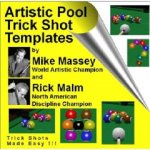Paul, why NOT reward someone for what you insist on calling a wired trick shot, though it's
only really 'wired' in 9b and it's difficult in all other games?
What is your objection to using a challenging trick shot to determine who gets the
advantage of shooting first?
We use the lag as a skilled shot that must be executed well to get first break advantage.
So why not let every break be a skilled shot that must be executed well
to get the first shot at controlling the table?
Is your main objection the time spent setting up the trick shot?
Because that's easily solved with a magic rack.
only really 'wired' in 9b and it's difficult in all other games?
What is your objection to using a challenging trick shot to determine who gets the
advantage of shooting first?
We use the lag as a skilled shot that must be executed well to get first break advantage.
So why not let every break be a skilled shot that must be executed well
to get the first shot at controlling the table?
Is your main objection the time spent setting up the trick shot?
Because that's easily solved with a magic rack.
